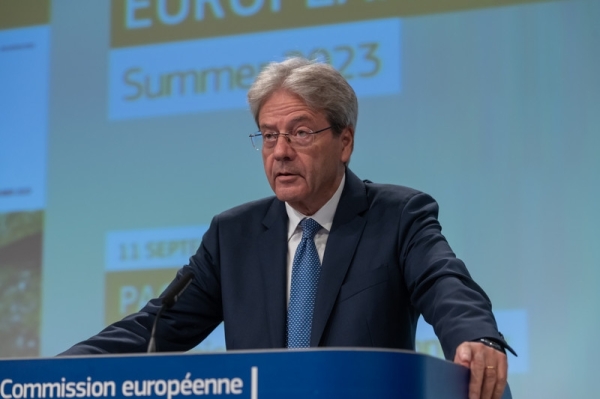Gentiloni warns joint borrowing needed for green targets
Next week the EU Council will enter negotiations with the European Parliament to start work towards a final agreement on the bloc’s debt and deficit rules.
In a discussion hosted in parliament on Thursday (11 January), economy commissioner Paolo Gentiloni said that reaching an agreement in the trilogues will likely be "hard" — and suggested the EU needs to borrow more to help member countries achieve their green and digital targets.
In a deal struck by member states in December, which may still partially be altered in negotiations with parliament, the existing limits of 60-percent debt and three-percent deficits are maintained.
Countries whose debt exceeds 90 percent of GDP will have to cut down their debt level by one percentage point of GDP every year. Member states that exceed the deficit limit will be placed under the excessive deficit procedure (EDP), which can lead to fines.
According to trade commissioner Valdis Dombrovskis, 14 member states are expected to cut spending in 2024 to stay within proposed deficit reduction targets in 2024.
Seven countries are in line with commission recommendations, namely Cyprus, Estonia, Greece, Spain, Ireland, Lithuania and Slovenia.
Eight or nine countries are likely to enter the EDP. France and Italy negotiated a temporary transition period that lasts until 2027. This reduces the amount of public spending that needs to be cut, but both countries still expected to have to reduce net expenditure the most.
Dombrovskis denied that the rules would result in some member states falling short on their green and digital investments, which, according to commission estimates, amount to €600bn a year on top of current spending.
"All member states plan to preserve national investment plans" to achieve EU green and digital targets," he told MEPs. "This stands in contrast to the substantial contraction of investment following the 2008 financial crisis and reflects the key lessons we have learned."
But in apparent contrast, Gentiloni, who is a member of the centre-left Socialist and Democrats (S&D), said that he "always gets scared" when looking at the investment needs and suggested that without significant new EU financing, member states will miss their green targets.
"It is very courageous to suggest countries will be able to achieve this without help," he said.
Countries are currently still supported in their investments by the EU’s recovery fund, which is worth €806bn. Italy is by far the largest beneficiary of the so-called Reconstruction and Resilience Fund (RFF), with a total of €122.6bn in loans and €71.8bn in grants.
But this money will dry up in 2026, with no fresh funds to replace it. "What happens after 2026?" said Gentiolni. "I know it is very difficult politically to discuss new financing tools, but we definitely need new tools."
Since 2022, Gentiloni and commissioner for internal markets Thierry Breton have been pushing for a fresh fund to replace the RRF in 2026—to help less wealthy member countries make their investment targets.
Although they have not said how much money should be in the fund, they previously modelled it on the SURE mechanism, which allowed countries to borrow €100bn cheaply via the EU, suggesting that it would mean substantial new joint borrowing.
But due to strong opposition against new EU borrowing, so-called frugal countries led by Germany succeeded in gutting the EU’s Sovereignty Fund down to only €1.5bn, making it unlikely that the council could agree on new EU funding anytime soon.
Gentiloni also said an agreement on new financing before the next EU elections in June will not happen.
But he called on MEPs to raise the issue during next week’s trilogue negotiations. "It is absolutely essential that we start discussing this now," he said.
This call was echoed by S&D lawmaker Margarida Marques, a party colleague of Gentiloni and co-rapporteur of the fiscal rules draft text in parliament.
In it, Marques agreed on a compromise that included hard debt and deficit reduction targets.
Greens leader Phillip Lambert has criticised this decision for being to the detriment of workers.
"Citizens will pay the price again for investments in the green transition, which are already insufficient in size, and can only be made possible by cutting expenses elsewhere," he wrote in a recent article published on the party’s website.
Decisions on potential spending reduction pathways for individual memebr states will be based on the economic figures of 2023 and are expected to be made in June.

